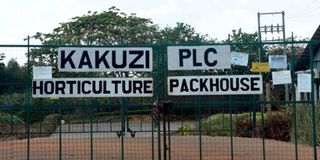Breaking News: Old Kijabe dam tragedy: Death toll rises to 45
Kakuzi issues profit warning

Enterance of Kakuzi PLC offices in Muranga County on October 14, 2020.
Agricultural firm Kakuzi has issued a profit warning, saying its 2021 financial performance will fall by at least 25 percent compared with 2020.
Kakuzi board chairman Nicholas Ng’ang’a issued the notice on Wednesday, as the firm blamed poor yields on its Hass avocados and low prices in its European markets for the poor performance.
“This profit warning notice arises from trading information, market forecasts and the preliminary unaudited full-year financial results, among other data sources currently at the Board’s disposal,” Mr Ng’ang’a said in the statement.
“We, therefore, wish to report that our earnings for the year ended December 31, 2021 will potentially be at least 25 percent lower than that reported for the year ended December 31, 2020.”
The firm’s Hass avocado production in 2021 had fallen by 18 percent from the previous year, he said.
“The anticipated drop in full year earnings is principally as a result of: Hass avocado production which is prone to a year of low production after a year of high production (a principle known as biannual bearing). As announced in the half year trading results commentary, the lower yield was anticipated,” he said.
Grave human rights allegations
Kakuzi also blamed an oversupply of the product from Peru and Columbia to the European markets as having led to lower prices, but it indicated that other crops performed well, such as macadamia.
In the 2021 half-year results, Kakuzi reported a 40 percent (Sh78.1 million) drop in its profits, from the Sh272.8 million profit reported in the six months to June 2020.
Between January and June last year, the agricultural firm saw its total avocado sales to outside markets drop by 101 per cent (Sh168 million), as sales to the UK and European markets dropped by 112.2 per cent (Sh154 million).
Even though the firm blames the poor financial performance on poor produce and low prices, the drop in avocado sales came amid suspension of its supplies by its leading customers in the UK and European markets - Tesco, Sainsbury's and Lidl - following grave human rights allegations that included assault and sexual misconduct by its Murang’a farms staff.
The supermarkets suspended Kakuzi supplies in October 2020 after the allegations were unearthed and by September last year, Tesco, the UK’s largest supermarket chain, was yet to reinstate the supplies.
The company has since adopted a series of measures to address human rights in its operations, including hiring a human rights issues manager and creating an Independent Human Rights Advisory Committee chaired by Kenya’s former Attorney-General Githu Muigai.
Kakuzi’s profit warning indicates that its profits in 2021 will be the lowest over the past six years, below Sh470 million. Since 2016, the company made an average of Sh594 million annually, with the weakest year – 2018 - recording a profit of Sh481.6 million.





